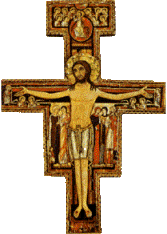God continues to reveal Himself to individuals "not indeed for the declaration of any new doctrine of faith, but for the direction of human acts" (St. Thomas Aquinas, Summa Theologica II-II q174 a6 reply 3). This post is a continuation from the last: Apparitions, Locutions, and Ecstasies. In it I failed to make the explicit connection between private revelation and prophecy; which I will do here.
"No one is obliged to believe in a recognized apparition, even Lourdes and Fatima which received the best guarantees. An apparition does not have as its function, the promotion of a new dogma, but to awaken the faith, charity, and especially hope. Thomas Aquinas stressed these points, and that the function of apparitions is essentially prophetic." [Laurentin, Rene. (1990). An Appeal From Mary In Argentina. Page 127, Milford, OH: Faith Publishing Company]
The above explanations serve to capture the essential characteristic of what private revelation is meant to accomplish. Properly discerned, it never threatens or contends with the 'Deposit of Faith'. This 'prophetic call' serves as an awakening or challenge to live the gospel more energetically where it is lackluster or dying. Ideally, we receive prophecy as a booster shot that arouses our awareness of spiritual matters.
Most of us find it rather easy to view this as the role of prophecy when we encounter it at a distance in Sacred Scripture. The detachment of time and space makes it easier to see the working of the living God among his people…but what of now? What is our expectation of ongoing prophecy? Has it ended with the passing of the last Apostle? If we understand the role of true apparitions and other private revelation as prophetic calls to resurrect our spiritual journey; to guide us into repentance, reparation, and renewal; we will not feel so threatened. We should rejoice that God chooses to speak anew to all generations.
The Church seems to accept the gift of prophecy with a prudent eye, which is for our benefit. Prophecy seems challenging and demanding partly because we often receive it when we are most complacent or wayward. This helps to explain why it is so often ignored or rejected. In addition to this (to use a modern analogy) our 'communication system' is so easily 'hacked' with fraud and deception; which is why careful discernment remains always in play. There seems to be no lack of false 'volunteer' prophets who want to insert their own message or vision into the mix. (Obedience to the Church, over and above any 'message', is paramount in avoiding confusion.)
"The apparitions are only episodes and particular facts in the life of the Church. They are not at all the essential, as are the Gospel and the Sacraments, dogmas and charity. They are a contribution, a stimulant to the faith and especially to hope, as we have seen. Particular attractions and devotions are left to the discernment of each one in the Church, which is a place of freedom. Christians adhere to them according to their affinities, and especially according to the inspiration of the Holy Spirit." [ibid. pg. 130]
This "place of freedom" mentioned above (as in all true freedom) does carry its responsibility for authentic discernment of the prophetic call. To discern is not to ignore and it would be a very poor excuse to close our hearts to any awakening of faith, hope and love. In other words, we should avoid such harsh skepticism that we preclude all possibility of opening our hearts to a surge of grace even in our own time.
Any 'prophetic call' can appear as both gift and admonition, simultaneously. Often it is met with resistance or ambivalence as it takes time for each of us to sort through our own conflicts and obstacles in our journey to God. We can and should hear 'the message' both on the individual level and again as a single body, 'the people of God'. We move together, for the most part, since we are united as a mystical body in communion with our Savior. Yet, in our freedom to respond to these prophetic calls, the 'seer' is aided by grace to act in singular accord if necessary, (sometimes the prophet stands alone) to the inspiration of the Holy Spirit in announcing or accomplishing God's will.
It does seem that the prophetic call can be directed to a specific or limited audience. Perhaps a religious founder hears a call to 'get moving' and accomplish a specific task for the Kingdom (think of the beginnings of many religious orders). Perhaps a whole nation can be called to renewal, as seems the case in San Nicolas, Argentina. Some even appear to be worldwide calls to awakening of the faith, as in Lourdes and Fatima. But importantly, the faithful Catholic should remain open to the possibility of hearing a prophetic call even in our current age.
To Awaken Faith, Hope, and Charity
Subscribe to:
Post Comments (Atom)





No comments:
Post a Comment